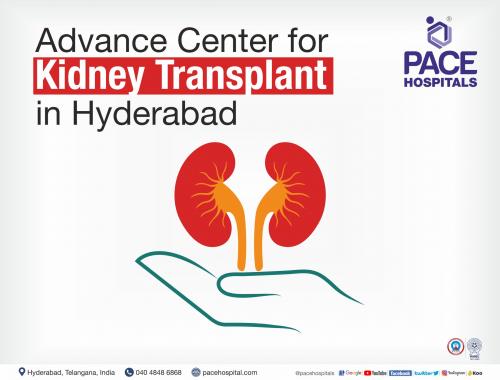Living & Cadaveric Kidney Transplant in Hyderabad with High Success Rate & Hassle free Process

A kidney transplant procedure is a surgical method to replace a diseased kidney with a healthy kidney from a donor. A deceased organ donors kidney or a living donor's kidney may be used. Immediate family members or others who are a good match for the kidney transplant may be able to give one of their kidneys. This type of transplant is also called a live transplant. Kidney donors can live a long and healthy life with just one healthy kidney.
The majority of the time, a single kidney is transplanted
into a recipient. In extremely rare cases, two kidneys are transplanted.
Kidneys from a deceased donor may be an option. The old kidney(s) usually not
removed and will be placed in the abdomen. However, the old kidney will be
removed out of the patient’s body under the following scenarios:
- · Infection that may spread to the patient’s new transplanted kidney.
- · Untreated or uncontrolled hypertension caused by old kidneys.
- · Back up of urine into the kidneys (urinary reflux).
Indications for kidney Transplantation
Kidney transplant is indicated for an end-stage renal disease (ESRD) patient, who might have kidney failure (< 15% of kidney function or glomerular filtration rate) as a life-threatening ailment.
The kidney transplant
is necessary in order to restore the normal kidney functions, such as:
·
Removal of urea and other liquid wastes from the
body. Urea is produced when protein-rich foods like meat, poultry, and certain
vegetables are digested in the body.
·
Maintenance of salts, electrolytes, and other
blood components in the blood.
·
Synthesis of erythropoietin, a hormone that
helps red blood cell development.
·
Regulation of blood pressure, fluids and
acid-base balance.
· A kidney transplant may also be required if the patient was born with kidney problems, such as congenital kidney abnormalities.
Types of Kidney Transplant
The types of kidney transplant are based on the donor and
their alive status. These are categorised into two types:
·
Deceased-donor kidney transplant
· Living-donor kidney transplant
Deceased-donor kidney transplant or Cadaveric kidney transplant: A deceased donor kidney transplant is described as the surgical transplantation of a kidney from a deceased donor whose native kidneys are not damaged and working correctly. Deceased donor organs are usually obtained from people who signed organ donor cards before death and wanted to donate their organs.
Living-donor Kidney Transplant: A living donor transplant is a surgery in which a healthy donor's kidney is surgically transplanted into a person with renal failure. A live donor is typically a member of the recipient's immediate family, such as a parent, sibling, or child; an uncle, aunt, or cousin; or even a spouse or friend.
Kidney Transplant Contraindications
Contraindications or non-eligibility
for the person donating (donor) the kidneys are as follows:
·
Under the age of 18 and above 70 years
·
Diagnosed with diabetes, active malignancy,
albuminuria and psychiatric disorders
·
Presence of human immunodeficiency virus (HIV)
·
Obesity (BMI > 40 kg/m2)
·
Glomerular filtration rate (GFR) less than 70
mL/min/1.72m2
·
Hypertensive treatment, consisting of more than
one medication
· Presence of horseshoe kidneys (formation of the horse-shaped kidney by infusion of two kidneys)
Contraindications or ineligibility
for recipients, if they are:
·
Inability to tolerate surgery due to the
presence of severe lung or heart disease
·
Having active malignancy, active drug abuse and
active infection
· Having uncontrolled psychiatric disease
·
Patient with a history of dialysis and
medication noncompliance
·
Presence of psychiatric problems and frailty
(condition of being delicate and weak)
· Patients with limited life expectancy (having less than the anticipated waiting time
Kidney transplant success rate in
India | Best kidney
transplant hospital in India
The kidney transplant procedure success rate in India is reported to be one of the highest in the world, with an estimated over 90% kidney transplant success rate for 7500 kidney transplantations per year.
Kidney Transplant cost in Hyderabad
Kidney Transplant cost in Hyderabad ranges vary from Rs. 6,50,000 to Rs. 9,00,000 (six lakh fifty thousand to nine lakh). However, price or cost of kidney transplant in Hyderabad depends upon the multiple factors such as age, patient condition, blood group matching, associated conditions, room selection in hospital and, CGHS, ESI, EHS, TPA-insurance or corporate approvals for cashless facility.
PACE Hospitals is one of the Top Kidney Transplant Hospitals in Hyderabad backed up with team of the best kidney transplant surgeons, kidney transplant doctors, transplant nephrologists (kidney specialist doctor), interventional cardiologist & pulmonologist, endocrinologist, vascular surgeon, infectious disease specialist doctor, psychiatrist, paramedical staff, dietician and physiotherapist in India.
Also, PACE Hospitals is among the best Hyderabad kidney transplant hospital, equipped with the Universal Surgical Robotic System, latest laser treatment equipment, state-of-the-art facility and modern technology offering comprehensive treatment.
Post Your Ad Here
Comments